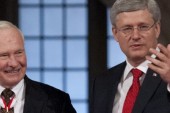
I’ve probably been called a faggot more times than I will ever suck dick. In school. As a teenager. From men who are bad at sex. From car windows. From my older brother. I’ve heard it so many times to the point of ambivalence. Am I allowed to feel individual about faggot? Or indifferent towards it, maybe even empowered by its use, if I’m using it to describe myself? Or am I supposed to agree that the slur is a truly ugly one, even if I might not even consider it a slur as much as a lazy insult? I’ve heard the word faggot so much — not just said to me, but around me — that when manic celebrities like Amanda Bynes or What’s-Her-Name-Banks say it, I barely manage an eye-roll. But, while I could once say I was passive in my relationship with the word, or that I don’t even flinch when it’s coming from some straight bro, I take real issue when another fag thinks it makes a perfectly good insult.
Several weeks ago, on Facebook, a friend tagged me in a picture of a silly — maybe tragic, depending on who you ask — note that a guy had written him. The context of why this particular note would be funny or sad isn’t important, suffice to say that two years ago, I authored an essay that provoked unforgiving opinions, due, in part, to the language I chose to described my own gayness. Anyway, one commenter on said Facebook post, a fairly accomplished queer filmmaker who I marginally respected, felt the need to affirm that I was, still, “some clueless douche.” I guess that’s saying it right to my face without saying it right to my face, so, in a somewhat newly-adopted policy, I decided to engage. Words were exchanged, sure, and I was left expressing dismay that a man whose work rests on documenting the nuanced experience of gay life would have nothing intelligible to say to me besides ultimately deciding, without much conversation, that I was a “delusional self-hating faggot.” Now being called a faggot has never really bothered me, or at least it stopped doing so a long time ago, because, well, conditioning. But this felt different, for the first time. When I facetiously commended his word choice, I was met with a pathetic retort, this one with an even deeper sting: “Again….I can live with that, faggot.” (Punctuation really is everything, isn’t it?)
Words are powerful. People are attached to words. Some even live and die by them. Fine. I am not yet sure if I am one of those people. Certain words only mean what I decide them to mean because I have learned that words are often more warped than we would like to believe. And I don’t just feel that way about contentious slurs. “Love,” for example, in all its guts and glory, is merely a loose agreement on an emotion we’re told feels, or should feel, like this or that, but with clauses so individual that it’s essentially the reason why singletons will keep going on, and why couples will keep breaking up. One person’s “love” is another’s prison.
Well, one person’s faggot is another’s power. I understand the homosexual appropriation-to-empowerment model of “taking back” words like queer and dyke: to disarm the enemy. Depreciators hurl such epithets to feel power, to strip power from the receiver of those words, from homosexuals, gays, queers, fags. In fact, I don’t believe I have ever questioned words like queer, as they became semantically re-appropriated to exemplify a positive life affirmation for a ’90s generation of beautiful libertines that needed shelter beyond complicated, very du-jour concepts like hetronormativity. Queer, in the best example, is now regarded as its own anti-gender-ish gay identity. You see it everywhere: from “queer studies” to “queer lit” to Queer as Folk to an addition lingering on LGBTQ. Although queer is as common and accepted among gays as the word gay itself and employed positively by, and across, a variety of communities, the idea of “queer” and its roots is still met with disapproval in certain circles, those weary of some radical political agenda, or unforgiving of its discordant past. But, despite its place as common epithet a short sixty years ago, the word is still here, and queer — and it’s fair game.
***
I love me a dick…two at a time…wrote the filmmaker in response to my unexpected annoyance. But it takes a certain amount of villainy to be a faggot.
No, I countered, he wasn’t being self-hating in the slightest. I think Putin would say — or, hell, probably has said — the same damn thing.
How topical, he scoffed, as if I wasn’t being dead serious. This, from the man who called me clueless minutes earlier.
***
Faggot has always had a tricky existence for me to reconcile, a word that has never, despite its few champions, taken a place in the spectrum. It is still a word with which, decidedly, gay men (or anyone, really) can be “othered,” depreciated and ridiculed. But what power do we give it when we take it away from ourselves? The connotation of fag has roots in something many men, gay or otherwise, seem to incessantly be preoccupied with: proving, defining, owning their “masculinity.” And so, faggot is anti-effeminate, and essentially misogynistic. In fact, the origin of faggot lies as “a term of abuse or contempt applied to a woman.” And if there’s one thing a man who uses such a word doesn’t want to be, it’s usually a woman. Here, I think, is — and might always be — the faggot’s roadblock to redemption. Queer doesn’t imply much besides “weird, peculiar, funny.” In the hetro-sphere, to be a faggot means to be unworthy of your own testicles. And the gay status quo has done very little to establish, or allow, the opposite. So where are all the faggots? They’re too busy trying to be masc.
Years before Azealia Banks held court on the word and its usage via a Twitter rampage (and the gay Twitterati bulldozed over her music career), or even further back than Perez Hilton getting punched in the face at an awards show a few years ago, the young’s interpretations and application of the word faggot has become increasingly complex and malleable, a part of the school-age vernacular, the everyday vocabulary, along with myriad similar slurs that seem to have less to do with sexuality as they do, say, gender.
“For all the outcry over harassment of gays following the murder of college student Matthew Shepard two years ago, anti-gay insults are still the slang of choice among children and teenagers, according to teachers, counselors and youths themselves,” says a Washington Post feature on the frequency of such language in American schools.
Many teenagers, let alone the things they say, are fatuous as a rule, but they’re also changing and evolving, much like the language and colloquialisms we debate (cunt, anyone?). That is to say that the majority of “young people are not bothered by the use of offensive slurs by their peers.” I’m not so sure, but it does say something more important about a larger translation: about context, about violence, about masculinity, about youth and semantics, about us, about the increasingly arbitrary nature of language.
***
The original slang, the original slur, comes to mind: gay. If there’s something else I take issue with, particularly in supposedly fully-formed adults, it’s the use of “gay” as an adjective. That’s so gay, you might hear at least once a day, usually from the most well-meaning people, pointing out that something is stupid, silly, embarrassing. It does make for a great case study because gay is so beyond appropriated, so tied to our identities as homosexual men beyond simple desire, that it’s become what you sometimes hope words could be: just a word. Jack Donovan, author of the feverishly-debated Androphilia, “a rejection of the overloaded gay identity and a return to a discussion of homosexuality in terms of desire,” offers insight into the word gay and what he thinks is its rudimentary place as a pejorative. Although I find myself mildly allergic to some of Donovan’s musings on masculinity and the gender-neutral illusion of what he describes as a “feminist pipe dream,” his etymology of gay describes, perhaps, not only why I find the friction around the word faggot to be almost irrelevant, but also why faggot is far more appealing as an outline for a new identity:
“Gay is a subculture, a slur, a set of gestures, a slang, a look, a posture, a parade, a rainbow flag, a film genre, a taste in music, a hairstyle, a marketing demographic, a bumper sticker, a political agenda and philosophical viewpoint. Gay is a pre-packaged, superficial persona—a lifestyle. It’s a sexual identity that has almost nothing to do with sexuality…The gay sensibility is a near oblivious embrace of a castrating slur, the non-stop celebration of an age-old, emasculating stigma applied to men who engaged in homosexual acts. Gays and radical queers imagine that they challenge the status quo, but in appropriating the stigma of effeminacy, the merely conform to and confirm long-established expectations.”
So what is the future of faggotry? Is it reclaimable? Read almost any essay on the subject and you’ll notice that there are typically more questions than there are, or might ever be, answers. In response that Azealia controversy, Steven Folkins at Hello Giggles writes,
“People often feel overly comfortable with the term, like my friend that uses the word fags in a joking manner — I know he’s not an anti-gay bigot, but I never feel okay about it, either. I don’t want to stand up and reclaim the word faggot, I don’t really like using the word. It feels offensive to me. That’s the thing about that word, though — I think it’s a personal choice. If Azealia Banks wants to use the word and she feels comfortable using it as a bisexual woman, then there’s nothing I can do about it. But it also poses the question: who can say what? Can a bisexual woman say it and it be okay, when the word is meant for a gay man?…What I think is wrong here, though, is her context and the constant issue of masculinity in gay culture. I don’t really care about Perez Hilton, nor do I read anything he does, but no one needs to be called out that way.”
***
And when, or where, will faggot evolve to, if at all? I vote for an examination of its positive connotations and uses, especially when dealing with matters of identity and community. The word is gaining traction, much like queer did, but for different reasons. There was 2009’s fagbug documentary, dubbed “activism on wheels.” There’s the beloved “art fag.” There’s Videofag. It’s used in monikers for Tumblr blogs about flowers and fashion. rad fag, the anonymous author behind Radical Faggot, a blog I’ve been enjoying and following in recent months, offers this explanation for his title choice:
“The reason I use the word “faggot,” and why I have given that title to this blog, is not to hurt or offend any members of any generation of my community, nor is it to shock individuals of any gender or sexual identity. Rather, in an era of mainstream media representation, invisible trauma and neoliberal reform, it is to remind myself and others who stand by me that we are different, we are abject, and we do exist in opposition to current social, political and economic orders. The goal of this realization is not, as so many tend to worry, to make us feel victimized, disempowered or hopeless. On the contrary, it is to remind us that as queers, as brown people, as women, as disabled, immigrant, poor and marginal communities, we have a unique role in tearing down the current order and imagining whole new ones which can bring justice to all people. It is only when we remember our opposition, invest in our outsiderness, that we can commit to working together to topple down power, rather than finding spaces for our individual benefit inside its oppressive machinery.”
I bet few remember when Dan Savage used the salutation “Hey, Faggot!” in his columns until he decided the word had found higher ground, only to use it later in contempt of gay conservatives. What needs to happen is less of those faggot-on-faggot insults, yes, but, as one friend suggests, wouldn’t the ultimate reclamation be achieved in the freedom to use the word as queers, freely, void of any real context and meaning, even to each other? Sure, there are strides to be made on how the gay community chooses to co-exist with its language, at odds with its desires to be free from it or defined by it. Yet the self-identified, celebrated faggot himself has a heavy cross to bear. To know how far he might still have to go is to look only as far as his current place in gay-cult proper, the root of all our instincts: in our bedrooms. Faggot will always be a divergent, twisted path of power and sex, of fantasy and reality: “Make me your faggot,” men will beg, and submit, and banter back and forth in Xtube videos — just see who’ll admit to it when they’re flaccid. Is one allowed to despise the word, and discourage its use, only to get off on it in porn, even secretly? Or is the wider objection found with this word only because it does feature so prominently in these bedrooms and scenes, as markers of submission? A huit clos, as the French say.
***
In the end, I was urged to chalk this Facebook mess up to jest; he was joshing around. He didn’t “know me as a person,” but he seemed justified enough in his counter because I myself had once displayed “shocking insensitivity.” “It was offensive…plain and simple,” he wrote about my work. (I wondered if he got the irony.)
And so I friended him anyway. Because, despite what you think you exempt yourself from, or how you chose to identify or don’t, or how you think such a word should be used, there is an unwavering, almost visceral, power to be found in faggot, something far beyond simple villainous antagonists, or even sexual objects. To me, faggot is the continual, necessary ownership of despotic, dated language structures that I stopped believing had any power a long time ago. Truth is: Faggot isn’t going to mean anything worthwhile, especially in a larger, hetero context, until gays stop using it as a weapon against themselves. There’s a potential for solidarity, and even courage, in faggot when used responsibly, a stark avowal beyond shock value, beyond the pleasantries and political correctness of diluted words like “queer.” If there’s something we could use a lot more, it’s faggots who are unafraid of their own shadows.
And he accepted my request.
————
Paul Aguirre-Livingston is a Berlin-based writer and former columnist for The Grid. Find him on Twitter or online.
For more, follow us on Twitter @TorontoStandard and subscribe to our newsletter.














